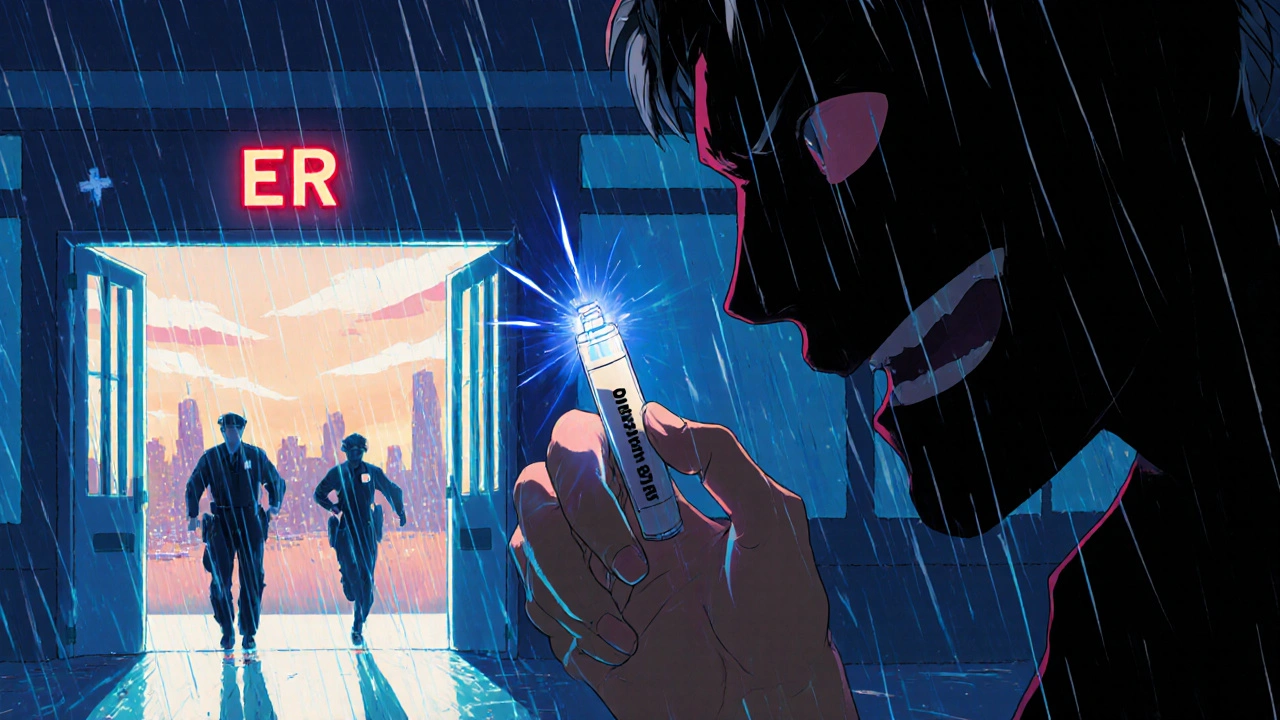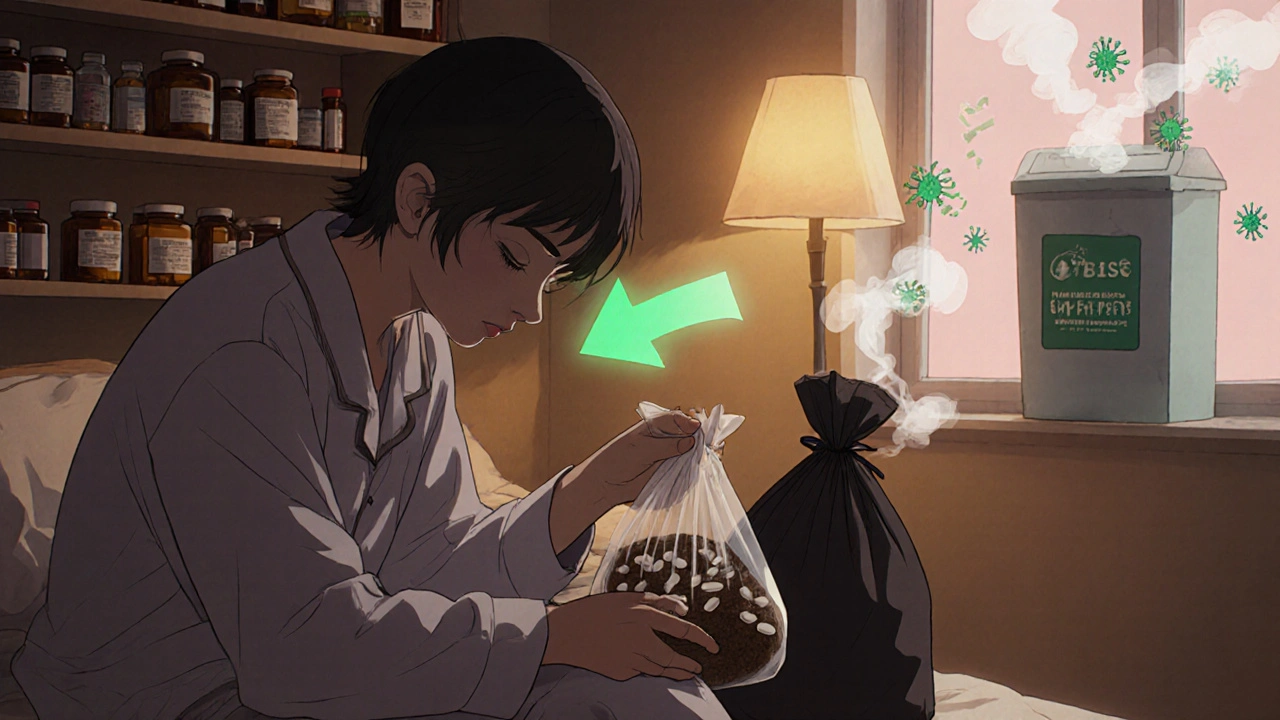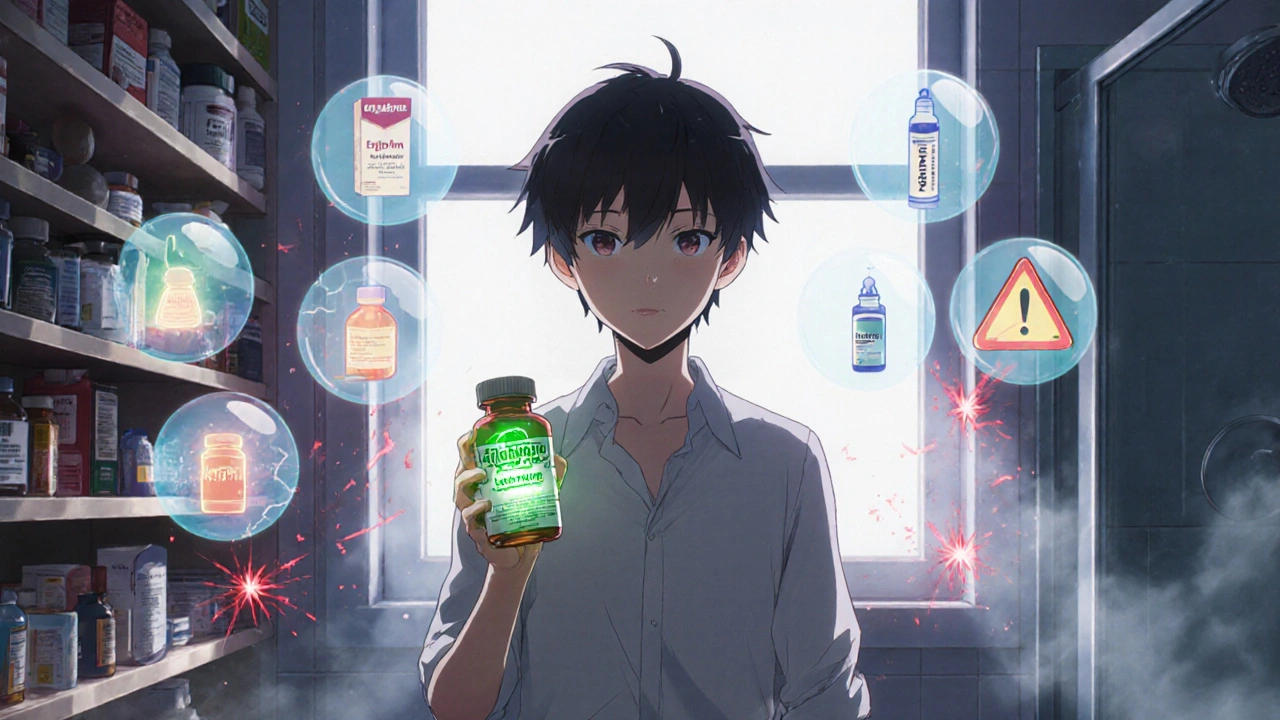You find an old bottle of ibuprofen in the back of your medicine cabinet. The label says it expired six months ago. Should you toss it? Or is it still fine to take? This is a question millions of people ask every year - especially when they’re dealing with a headache, fever, or allergy flare-up and don’t want to run to the pharmacy. But the answer isn’t as simple as "yes" or "no."
What Does an Expiration Date Really Mean?
Expiration dates on medications aren’t just random labels. They’re the last day the manufacturer guarantees the drug will work as intended and remain safe under proper storage conditions. This requirement comes from U.S. federal law passed in 1979, which forces drug companies to test their products under heat, light, and humidity to figure out how long they stay stable.
That doesn’t mean the medicine suddenly turns toxic on the day after the date. Many pills and capsules stay chemically intact for years beyond expiration - especially if they’ve been kept in a cool, dry place. The FDA’s own Shelf Life Extension Program, which tested military stockpiles, found that 90% of drugs remained effective up to 15 years past their labeled date. But here’s the catch: that data is from controlled military storage. Your bathroom cabinet isn’t a military warehouse.
Not All Medications Are Created Equal
Some drugs hold up well past their expiration. Others? Not even close.
Stable medications - like acetaminophen, ibuprofen, and aspirin - often retain most of their potency for years. A University Hospitals study found ibuprofen still had 90% of its strength five years after expiration when stored properly. If you’ve got a headache and only expired pills left, taking them might help. It won’t hurt you.
High-risk medications are a different story. If you rely on these for life-saving treatment, don’t risk it:
- Epinephrine (EpiPen): Loses up to 30% potency within six months after expiration. In a severe allergic reaction, that drop could mean the difference between life and death.
- Insulin: Starts breaking down after opening, even if refrigerated. Expired insulin can cause dangerously high blood sugar.
- Nitroglycerin: Used for chest pain. Loses half its strength in just three months after opening - regardless of expiration date.
- Antibiotics (like amoxicillin): Don’t become toxic, but they lose effectiveness. Taking weak antibiotics doesn’t just fail to treat your infection - it can lead to antibiotic-resistant bacteria.
- Thyroid meds (levothyroxine): Even small drops in potency can throw your metabolism off balance.
- Eye drops: After expiration, they become breeding grounds for bacteria. One study found 60% of expired eye drops were contaminated.
And then there’s tetracycline. This older antibiotic degrades into compounds that can cause kidney damage. There are documented cases of people ending up in the hospital after taking expired tetracycline - even just a year past the date.
Storage Matters More Than You Think
Your medicine’s lifespan isn’t just about the date on the bottle. It’s about where you keep it.
Storing pills in the bathroom? Big mistake. Humidity from showers and sinks speeds up degradation. The FDA says medications stored in humid environments break down 40% faster than those kept dry.
Heat is just as bad. If your medicine sits in a hot car, near a radiator, or in direct sunlight, it can lose potency in days. Liquid antibiotics can drop 50% effectiveness in just 72 hours at 104°F (40°C). That’s hotter than most summer days in Toronto.
Keep meds in their original containers, with childproof caps tightly closed. Store them in a cool, dark place - like a bedroom drawer or kitchen cabinet away from the stove. Amber glass bottles offer better protection than plastic, but most prescriptions come in plastic. So, keep them out of light.

What Happens If You Take an Expired Medicine?
Most of the time, nothing bad happens. You just might not feel better.
For a mild headache or stuffy nose, taking expired acetaminophen won’t poison you. It might just not work as well. But that’s the problem - you won’t know if it’s working. You might take a second pill, then a third, thinking it’s not doing its job. That increases your risk of overdose or side effects from too much.
For serious conditions? The risk is real. A Reddit thread from October 2023 with over 1,200 responses showed that 68% of people had taken expired meds in the past year. Most used them for minor issues. Only 3% reported side effects. But among the 5% who used expired epinephrine during an allergic reaction, 40% needed emergency care because the EpiPen didn’t work fast enough.
And here’s the silent danger: taking weak antibiotics doesn’t just leave you sick longer. It lets bacteria survive and adapt. That’s how superbugs like MRSA and drug-resistant E. coli spread. The CDC links incomplete antibiotic courses - often from expired meds - to rising antibiotic resistance.
When Is It Okay to Use an Expired Medication?
There’s one clear exception: emergencies.
If you’re having a severe allergic reaction and your EpiPen is expired, use it anyway. Same with nitroglycerin during chest pain or albuterol during an asthma attack. The American Medical Association and emergency doctors agree: use the expired version if it’s your only option - then get to a hospital immediately.
For minor, non-life-threatening issues - like a headache, mild heartburn, or a cold - taking a pill that expired a few months ago is low risk. But don’t make it a habit. Replace it as soon as you can.
Never use expired medications for:
- Chronic conditions (diabetes, thyroid, seizures)
- Infections (antibiotics, antifungals)
- Heart or blood pressure meds
- Any liquid, injectable, or eye drop
How to Safely Get Rid of Expired Medications
Don’t flush them unless they’re on the FDA’s Flush List. That’s only 15 drugs - mostly powerful opioids like fentanyl and oxycodone - where the risk of accidental overdose outweighs environmental harm.
For everything else:
- Take pills out of their bottles.
- Mix them with something unappetizing - coffee grounds, cat litter, or dirt.
- Put the mixture in a sealed bag or container.
- Throw it in the trash.
- Scratch out your name and prescription info on the empty bottle.
Better yet? Use a drug take-back program. There are over 14,500 authorized collection sites across the U.S., including many pharmacies and police stations. In Toronto, drop-off bins are available at select pharmacies and public health clinics. Only 32% of people live within 10 miles of one - but it’s worth the trip.
Don’t pour pills down the sink or toss them in the recycling. Medications in water systems are a growing environmental problem.

What Should You Do Right Now?
Here’s a quick checklist:
- Check all your medications - especially ones you use rarely.
- Look for pills that are discolored, cracked, or smell odd.
- Throw out any liquid meds that look cloudy or have particles.
- Replace EpiPens, insulin, and nitroglycerin immediately after expiration.
- Store remaining meds in a cool, dry place - not the bathroom.
- Dispose of expired drugs properly, using take-back programs or the FDA’s home disposal method.
Keep a small, updated medicine kit for emergencies. Replace items every 6-12 months. If you take daily meds, set a calendar reminder to check expiration dates every quarter.
Frequently Asked Questions
Can expired pills make you sick?
Most expired pills won’t make you sick - but they might not work. The exception is tetracycline, which can degrade into toxic compounds that damage your kidneys. Other medications lose potency, so you might not get relief. In rare cases, degraded liquid meds or eye drops can cause infections.
Is it safe to take expired antibiotics?
No. Expired antibiotics like amoxicillin or doxycycline often lose effectiveness. Taking them can let bacteria survive and become resistant. That doesn’t just hurt you - it makes future infections harder to treat for everyone. Never use expired antibiotics, even for mild symptoms.
How long after expiration is ibuprofen still good?
Under ideal storage conditions (cool, dry, dark), ibuprofen tablets can retain 90% of their potency for up to five years past the expiration date. But if stored in a hot or humid place, that window shrinks to a year or less. If it looks or smells off, toss it.
What should I do if I took an expired EpiPen?
If you used an expired EpiPen during a severe allergic reaction, call 911 or go to the ER immediately. Even if you feel better, the medication may not have worked fully. Delayed reactions can happen hours later. Always carry two EpiPens and replace them before they expire.
Can I still use expired allergy medicine like Benadryl?
If it’s a tablet or capsule and only a few months past expiration, it’s likely still effective. Benadryl is stable and doesn’t degrade into harmful substances. But if it’s liquid, or if it’s been over a year past expiration, replace it. For serious allergies, always use a fresh antihistamine.
Final Thought
Medications aren’t like milk. They don’t always spoil the day after the date. But they’re not guaranteed to work either. The safest rule is this: if it’s critical to your health, replace it. If it’s for something minor, use it cautiously - and replace it soon. Your body deserves medicine that works as it should.


Conor McNamara
November 18, 2025 AT 02:29i read this and thought oh great another government lie. they say expiration dates are for safety but i bet theyre just profit traps. why would a company spend millions testing drugs for 15 years past expiry? they want you to keep buying. my grandad took aspirin from 1998 and lived to 97. coincidence? i think not.
steffi walsh
November 19, 2025 AT 19:33omg this is so helpful!! 🙌 i just found my old ibuprofen and was about to toss it 😅 now i feel better knowing it’s probably still good! thanks for breaking it down so nicely!! 💖
Leilani O'Neill
November 21, 2025 AT 08:30How utterly irresponsible to suggest that anyone would consider ingesting pharmaceuticals past their labeled shelf life. This isn't a garage sale. Medication isn't artisanal cheese. If you're too lazy to replace your EpiPen or insulin, you deserve the consequences. The FDA isn't a suggestion box-it's a legal mandate. Your ignorance is not a lifestyle.
Riohlo (Or Rio) Marie
November 21, 2025 AT 19:54Oh darling, let’s not pretend this is science-it’s capitalism in a pill bottle. The FDA’s ‘Shelf Life Extension Program’? A PR stunt funded by Big Pharma to make you feel guilty for not buying new bottles. And don’t get me started on ‘proper storage.’ Who keeps meds in a dark drawer? I store mine next to my toothpaste-humidity is life, honey. Also, tetracycline? Please. I’ve been taking expired doxycycline since 2018. My skin is flawless. Your fear is just your inner capitalist speaking.
Heidi R
November 23, 2025 AT 01:08You’re all ignoring the real issue: the lack of universal drug take-back infrastructure. If we had free, accessible disposal, people wouldn’t hoard expired meds. But no-corporations profit from fear and convenience. And you’re still reading this instead of going to the pharmacy.
Brenda Kuter
November 24, 2025 AT 12:06WAIT. So you’re telling me the government KNOWS meds last 15 years but still makes us pay for new ones? This is a global conspiracy. They’re poisoning us with cheap generics and hiding the truth. I’ve got 30-year-old penicillin in my basement. I’m not taking it… but I’m keeping it as evidence. Someone needs to expose this. #PharmaLies
Shaun Barratt
November 24, 2025 AT 22:40While the article presents a generally accurate overview of pharmaceutical stability, it is important to note that degradation kinetics vary significantly based on formulation, excipients, and environmental variables. The FDA’s data, while robust, is derived from controlled, accelerated aging studies under ISO 10993 protocols. Real-world conditions, particularly in tropical or humid climates, may accelerate decomposition beyond predictive models. Caution remains prudent, especially with liquid and injectable formulations.
Iska Ede
November 25, 2025 AT 12:11So let me get this straight-you’re telling me I can take my expired Advil like it’s a vintage wine? Cool. Meanwhile, my cat’s on antibiotics and I’m supposed to risk her life because I’m ‘too cheap’ to refill? 😂
Gabriella Jayne Bosticco
November 25, 2025 AT 13:31Really appreciate the breakdown on storage-never thought about how the bathroom is basically a sauna for pills. I moved mine to a drawer last week and already feel more in control. Small changes, right? Also, if you’re unsure, just call your pharmacist. They’re usually happy to help-even if you’re not a patient there.
Sarah Frey
November 26, 2025 AT 03:21This is an exceptionally well-researched and balanced piece. The distinction between low-risk and high-risk medications is critical, and the emphasis on proper disposal addresses an often-overlooked public health concern. I encourage everyone to conduct a biannual medication review-not out of fear, but out of responsibility. Your health deserves nothing less than precision.